#got analysis
Explore tagged Tumblr posts
Text
We joke but the fact NO ONE bats an eye when Penelope and Colin are unchaperoned in broad daylight, or the way they keep to themselves in the corner of balls and other events, speaks a lot of how little the ton considers Penelope as a desirable debutante. Fife and co mock Colin for his friendship with her. Portia catches them alone in a room and somehow doesn't jump on the YOU MUST MARRY train. Even Anthony, albeit s1 Anthony so he's a bit dumb, comments that Colin has danced multiple times with Penelope yet it does not signify.
Side note but I would kill to see his reaction when he hears Colin interrupted Penelope's and Debling's dance lol.
Everyone sees Colin running after Penelope multiple times this season, and everyone assumes it's out of pity, rather than care. Like she's not even the one chasing him, he's the one doing it in all four episodes!
Never in their wildest fantasies could they imagine Colin Bridgerton being interested in Penelope Featherington indeed. And oh boy, are they in for a rude awakening! Because that boy is already loud with his actions when he wasn't even aware of his feelings, but he's gonna be even louder with his words to make sure everyone understands how much Penelope Featherington is beloved by him.
#bridgerton#bridgerton s3#colin bridgerton#penelope featherington#polin#this is a prelude to another longer analysis post i wanna write i cant believe this show got me so hooked wtf#star.txt
9K notes
·
View notes
Text
It occurred to me that some people missed the fact that Ekko and Powder are already in a romantic relationship in the AU even before Arcane Ekko came in, so here's a thread:
First moments they have, Powder is already invading his personal space and is very touchy. Could be taken from the fact that Pow is touchy in general. But after the dance it gets more intimate.


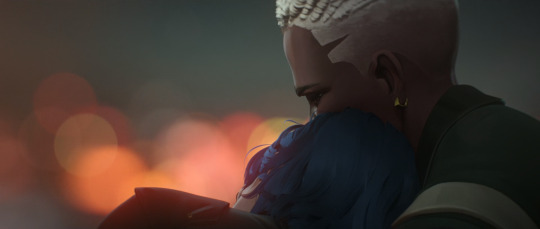
2. There was no need to hold his hand but the girl has to talk her to her man asap, then adding another touch of comfort after she scolds him for not sleeping properly.
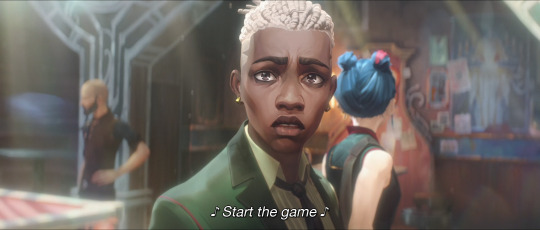

3. They draw each other with/in hearts and apparently also give each other flowers with 'I <3 YOU' notes.
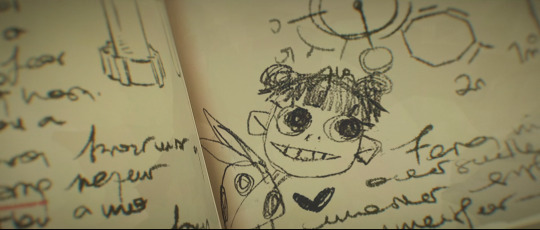


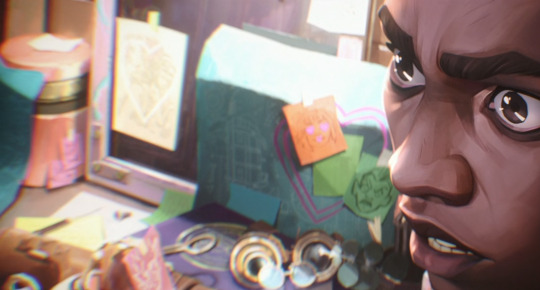

4. Someone "just crushing" wouldn't be able to be this confident when approaching said crush.



4.5. Extra detail: Powder's shoes having original Ekko's outfit colours matches when Ekko had Jinx's stripes on his own during the battle.

5. She was WAY too casual during the first lean in, almost as if it wasn't the first time they've done this. Note: she's already aware there's something going on with Ekko and backed away when he did because she didn't wanna push him.

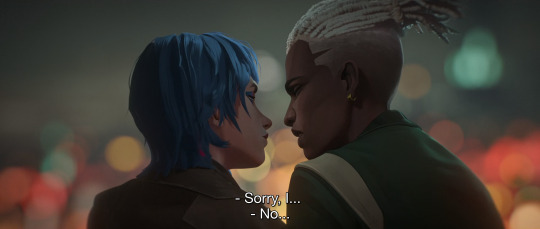
6. That's because it wasn't the first time, per confirmation on Ekko's part. He probably asked Heimerdinger what his relationship was with Powder along the way, leading him to ask the 'first time' request when kissing her was no longer avoidable.


#arcane#arcane analysis#jinx and ekko#jinx arcane#ekko arcane#timebomb#WAAAAAHHHHH#I CAN'T BELIEVE THEY'RE ACTUALLY CANON#I was hoping for a hug at most but got an all you can eat buffet lol
7K notes
·
View notes
Text
So like. Did anyone else notice that Jayce doesn't immediately shoot Viktor? He only powers his hammer on AFTER Viktor has opened his eyes. Below is Jayce's reaction to seeing Viktor (his Viktor, from his universe, not the future version of him) for the first time after walking into the dome. For the first time in months. That's like. A look of wonder. Almost reverence.

Assuming the Jinx/Rictus/Vander fight is cut to real-time after Jayce has gone into the dome, he's staring at Viktor for like. 5 minutes.

My interpretation here, of Jayce's expression just before Viktor finally opens his eyes to see Jayce in the room with him, he's committing Viktor to memory, before he has to kill him.
Edit: I almost missed it but like. HE IS SMILING For like 2 frames it's an outright smile. He leans in towards him, too. I cannot handle this.


#Arcane Spoilers#jayvik#arcane#arcane season 2#Jayce Talis#Viktor Arcane#arcane analysis#ok not quite 5 minutes but like 3 minutes#the first glance is like almost a smile? he wants to be happy to see him#He doesn't want to kill him#But he's seen the horrors this will lead to so he has to#And potentially Future!Vik is controlling him to some extent?#At least that's what this universe's Viktor sensed I guess with Jayce's interaction with Salo#But like. Let's be honest#Salo has a VERY punchable face#Jayce just got to whack-a-mole his ass#GOD every frame of this show is a work of art#It's so fucking good#Also not me finishing out the episode even though I was just looking for Jayvik screenshots#Because Isha's final sequence with her memories with Jinx is so heart-wrenchingly beautiful#I've seen it so many times but it never fails to make me cry#Nabexis thinks
1K notes
·
View notes
Text
Like, the crux of House and Wilson’s relationship for Wilson is that Wilson is somewhat preforming kindness and empathy, and around House he doesn’t have to. He can be fucked up and a little weird, and play increasingly destructive pranks. He can fight with house, and punch him in the face and ask him to dinner a second later and he doesn’t have to preform normality because there is genuinely nothing he can do to ruin this friendship.
And the crux of House and Wilson’s relationship for House is that Wilson see past House’s bs and sees the sliver kindness in House’s heart, the one house keeps hidden away deep under layers of sarcasm and insults. It’s not all the time, as house still gets defensive when Wilson says something that hits a “sore spot”, but House is still kinder with Wilson than he is with anyone else, he shares his fears with Wilson, and makes sacrifices to make him happy. He doesn’t have to preform his “asshole persona” because Wilson’s the only safe person to be venerable with.
This is why they need each other, because they have to preform with everyone else, and they always end up back together because we all need someone we can be authentic with, and it’s why they’re so lonely without each other.
#House#house md fandom#house md#house analysis#house fandom#house x wilson#gregory house#greg house#hilson#hilson analysis#james wilson#james evan wilson#they need each other#and therapy#I need an insane codependency like this 🥺#rip any love instests#none of them are as important as thiss weird gay thing they got#imagine being Wilson’s wives tho?#imagine marrying a guy only to come second to his weird asshole friend who hates u
1K notes
·
View notes
Text
one thing that i find interesting is that even though we never get to interact with Marika directly, only knowing her via obscure cutscenes and other characters' dialogue... she actually displays a wide range of emotions as much as any other NPCs.
her statues depict her as having a warm, gentle smile:
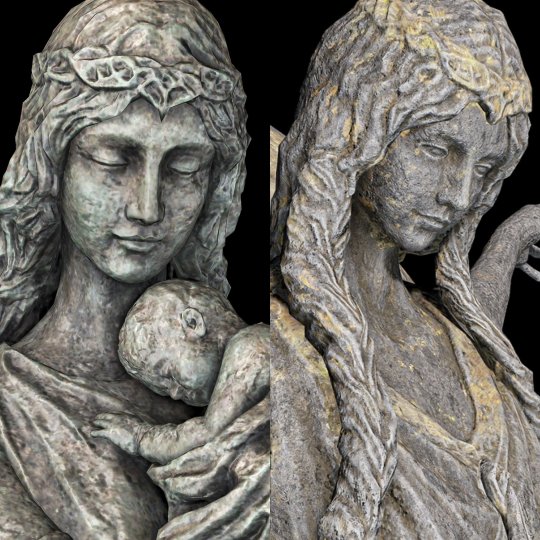
the Mimic veil description points to her playful, mischievous side:
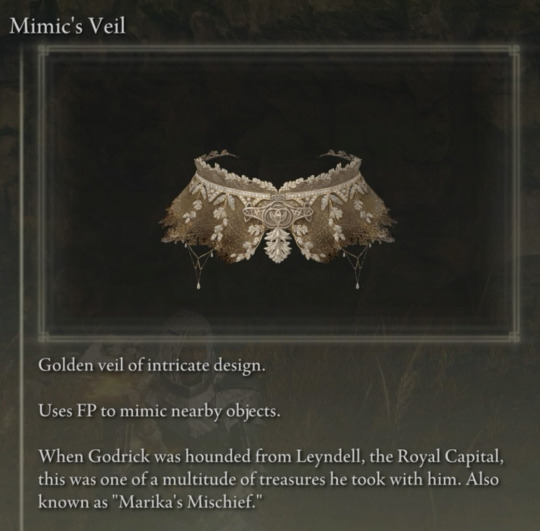
(it's a popular theory in the JP/Asian side of the fandom that it's sth from her childhood - hence the "Marika's Mischief", not "Queen Marika's", and she used it to escape the grisly fate befalling her family.
additionally, its equivalence in Dark Souls is also something described as "the mischief of a young girl who sought relief from the solitude of the woods at dusk", aka Princess Dusk who hails from "Oolacile, land of ancient golden sorceries", but i digress)
her portrait, the story trailer's "Queen Marika was driven to the brink" and Gideon's dialogue after the player defeated Malenia pointed out her sorrow:

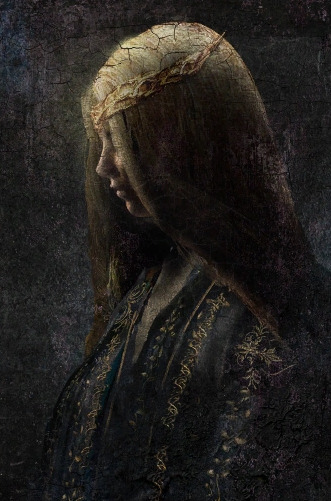
(back when i first played the base game, this is the portrait that drove my eyes most in Roundtable Hold. i kept gazing at her - the Queen with permanently lowered eyes, and thought "there is a girl in there")
The bat lady's song, Messmer's entire Crusade, all those conflicts to establish the Erdtree, shows her anger, and the cruelty she's capable of:

Then there's Shaman's village, the clinic underneath Shadow Keep, the golden braid, the Minor Erdtree, the sealing of Death - that points to grief, trauma, survivor guilt, kindness, and the ruinous drive for revenge that results in the above path down hell:

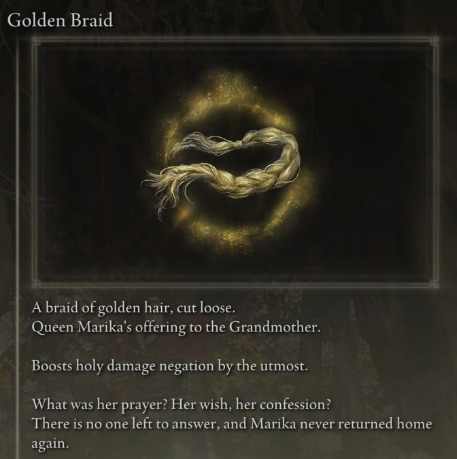
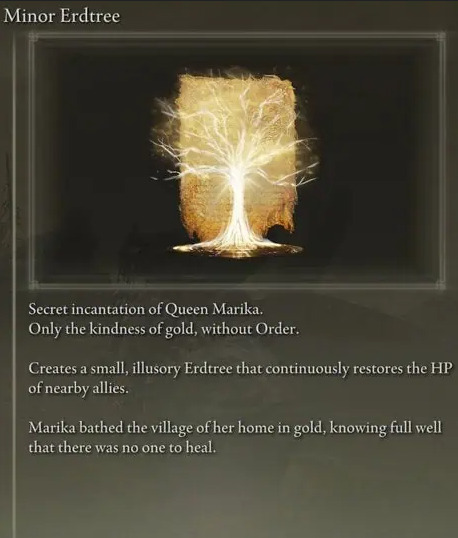
(there's also a theory for the Crusade's headless statue being a reminder for the Hornsent of what they put Marika's mother through, but it's not concrete canon so here is the link if you want to check it out)
The fact that all of Erdtree's incantations are heal and protection spells (with only one exception of Wrath of Gold spell which was found after the Elden Ring was shattered), the Capitol's Perfumers originally being blessed healers, and that all Erdtree blessings come in the shape of tears give the picture of Marika's gentle wish at the beginning: to heal everything and everyone.
(and to me personally, there's a kind of vulnerability and honesty in showing your tears to the world and let it be your power to heal at the same time.)
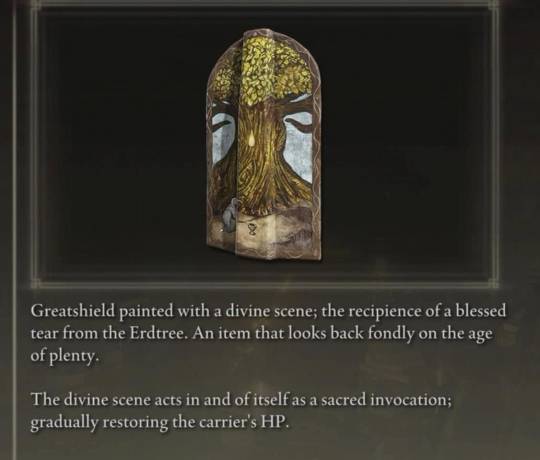

the eye she blessed Messmer with (i do think the Eng translation at some part lost the sentiment of the JP text - that the eye is always referred to as a blessing)
the blessing flask that - unlike its Dark Souls equivalent (which ranges from 6-13 flasks), only have 4 available to us player, heal all ailments and status effect, and specified as sth made for Messmer.
the Marika's soreseal in the Haligtree + the waterfall near Godwyn's final resting place
the Regal Omen Bairn (that was fashioned after the Jizo statue - sth made by grieving parents wishing for protection for their deceased child in the afterlife)
the blessing, gifts, equipment that Messmer and Godwyn's personal knights all get
the fact that Marika's bedchamber and the Impaler's Catacomb (which is the only catacomb in the base game to have the spike trap mechanic used in catacombs in the DLC) remain the proof of Messmer's existence in the base game
how Godwyn's ending is the only ending where the mending rune is placed on the position of Marika's womb (the lower arc or the Elden Ring - also referred to as the basin in which its blessings pool)
that's a whole barrage of motherhood. the love, the fear, the postpartum depression, the guilt and anxiety, (the occasional scheming for revenge with her son). and despite how flawed and tragic that love ends up being for all of them, it is there.
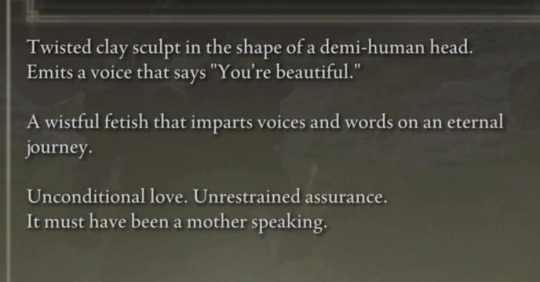
(there's a whole subplot about how Messmer is the only demigod to be called ugly in-game (Hornsent npc dialogue) while Boc's questline is about how his mother being the only one to always assure him he's beautiful, despite everyone else calling him ugly. and how each NPCs questline does reflect a wider theme seen in Marika and her children. but again, i digress)
every time i think of her, Marika is a constantly shifting kaleidoscope, holding everything from within (the beauty and the malign, light and dark, birth and death, she's warm and gentle, she's cruel and unjust, she's strong and kind, she's weak and resentful, she's sweet and she's bitterness made flesh)... and i could only stand there and admire it all.
#elden ring#queen marika the eternal#my uwu baby with a disorder#every time i do the ending the only thing in my head is “to you who bloomed and fell away as a fruitless flower. farewell”#she got me writing essays like the average fandom male character analysis :)#messmer the impaler#er brainrot#golden doomed mother and son#ending this year with another marika rant like god intended
913 notes
·
View notes
Text
It's often noted, in discussions of the Death Note anime, that it's much weaker than the manga in its rendition of post-timeskip events partly for pacing reasons: the pre-timeskip parts of the anime adapt ~6.5 manga-volumes in 25 episodes, while the post-timeskip parts adapt ~5.5 in 12 episodes, so a lot more important detail-work is lost and the whole thing ends up feeling kind of perfunctory.
Much less often noted as far as I've seen, but nonetheless also true, is that the Death Note anime removes some important characterization-nuance from Light, starting right near the beginning, whose presence elevates the manga to be substantially better than the anime even before the time-skip.
In particular: the Death Note manga is, at its core, a tragedy in classic "character who has everything falls into ruin due to a fatal personal flaw" style. Light is a brilliant student who, in the future ahead of him, has the potential to do practically whatever he wants. He's driven to ruin by the fatal flaw of unwillingness to admit, either to others or to himself, when he's made a mistake. This flaw is an essential piece of his characterization, in the manga. And the anime pretty much entirely skips over it.
As portrayed in the manga, Light's decision to become Kira—which ultimately leads to his downfall—is made in the following way. First, he finds the Death Note, and is led by morbid curiosity to write a name in it, killing someone. Then, still not really believing it, he kills a second person too. At which point it hits him that he's killed two people. And at that point, after a viscerally-horrified breakdown about what he's done, the inability to admit mistakes kicks in, and he proceeds to rewrite his own value-system such that it yields the result that killing those people was actually okay, and in fact morally good. Because the alternative would be for him to acknowledge himself as having made a terrible mistake, and that, more than anything else, is something he's unwilling to do if he can see any other option at all. And then, having convinced himself that those two murders were good, he proceeds to reason that, if they were good, then doing more like them is good; and thus he becomes Kira, leading eventually, far down the line, to his ruin. The anime, by contrast, substantially deemphasizes this flaw of his, portraying him as much more calmly put-together through that series of events and thus making him come across as having been tempted in becoming-Kira-ward directions all along.
Similarly, in the anime, when Light leaks a bunch of information to L about his identity by using non-public information acquired via police channels, he declares that actually this was deliberate as a means of baiting L out so he can kill him, and the anime presents this declaration pretty uncritically. The manga, by contrast, presents it as an extension of that same character-flaw: Light is unwilling to admit to having actually just straightforwardly messed up, and therefore makes up a new plan to view himself to have been following-all-along, thus leading him to take more risks in his game against L going forward and thus, once again, helping him along the path to ruin.
Et cetera.
Compared with the manga, then, the anime's version of Light's characterization ends up less interesting. And, moreover, it introduces a plot hole, when the Yotsuba arc comes around! It makes it much less clear why an amnesiac Light would be so straightforwardly aligned against Kira. In the manga, this is pretty clear: a Light who never killed anyone wouldn't have rewritten his values to consider killing people to be good, and therefore would look at Kira as straightforwardly evil. And, in fact, his amnesiac self has trouble taking the possibility of his having been Kira previously, even as the evidence starts building up, because becoming Kira would be a mistake according to his value-system of the moment, and this leaves him having a very hard time contemplating the possibility of its having in fact happened! Whereas the anime, by deemphasizing Light's big flaw, makes his amnesiac-self's differences from the way he is for most of the story up to that point come across as much more out-of-nowhere, much less narratively well-founded.
So, overall, the people who talk about the Death Note manga as superior to the anime specifically post-timeskip strike me as somewhat understating things. The manga is superior to the anime pre-timeskip, too, via that extra layer of characterization and a resulting improvement both in character-interestingness and in plot-coherence. And thus I consider the manga to be very much the definitive version of Death Note from start to finish, despite the anime's relatively-higher popularity.
#Archive#Death Note#Analysis#there was a gap of about a decade between when i first watched the death note anime and when i first read the death note manga#(the me of ~2011-2012 when i first watched the anime was bad at recognizing characters / following action / etc. in black-and-white comics#and thus impaired in her manga-reading abilities in general)#but i'm glad i finally got around to reading the manga eventually#even if it did take me a while#(to be clear: i read it in 2022; this post isn't downstream of having recently read the manga)#(just of having recently been thinking idly about it and thus remembering this as an infodump-possibly-worth-posting)
577 notes
·
View notes
Text
Sorry, your boyfriend got reincarnated. Yeah, he doesn’t remember that time you murdered him with your bare hands. He doesn’t know how much you love him. He doesn’t know that you’ve killed for him. He doesn’t know that you’ve killed him. He doesn’t know it’ll happen again. As he takes your hand and your heart, and you laugh from atop an animal the two of you ride together, he doesn’t know you’ve been here before. He doesn’t know it’ll happen again.
#in order we got: llama. horse. panda? llama. camel#sorry for trafficshipping it’ll happen again#scarian#hermitshipping#<- ig??#idk they’re /p in my mind but I have no way to justify that lmao#traffic series#life series#third life#last life#double life#limited life#secret life#grian#goodtimeswithscar#nerdy’s traffic analysis#poetry#?
5K notes
·
View notes
Text


something something The Prince kisses away Utena's tears something something the tears are what save Anthy in the end
#i got the utena brainrot again#do you see my vision#rgu#revolutionary girl utena#utena tenjou#utena analysis#rgu spoilers
481 notes
·
View notes
Text

art gallery
#inhun#457#seong gi hun#hwang in ho#squid game#painting is the survivor by magritte#credit for the idea to yogvampowerment on tiktok. i love his videos on squid game a lot#especially the analysis of what was on inho's table in season 1. got me embarassed that i didn't really think all that hard about it#shouldn't have dropped out of art school maybe. now i draw yaoislop. anyway
542 notes
·
View notes
Text
they really had irving bailiff say out loud on my tv screen in front of the man hes in love with that he's never been loved before and I'm just supposed to.....what. fucking kill myself or something I guess
#like i knew that.#ive BEEN SAYING IT. for weeks#that irving b probably got to experience something his outie never has#i knew that. and i placed it as the basis of a lot of my analysis#but i did not under any circumstances want to hear him say it out loud#i did not want it to be acknowledged#severance#severance spoilers#irving bailiff#irv tag
462 notes
·
View notes
Text
I actually love Anthony Bridgerton’s “I will humble myself before you” speech because it’s not only the perfect culmination of Anthony’s character arc throughout season 2 but also of Kate’s.
Throughout the season, we see Kate as someone who believes that she has to earn the love in her relationships. She believes that if scrapes and begs and borrows to keep her family afloat, then she can earn her place with Mary and Edwina. If she pleads with the Sheffields even at the cost of her own pride to make sure Mary and Edwina are taken care of, then she can continue to earn her family’s love. Kate is so used to sacrificing everything she has and then going even beyond that, to earn her place in her personal relationships.
And then here comes Anthony with his “You do not have to accept it or embrace it or even allow it”.
His love is freely given, without even the expectation of acknowledgment, right from the moment he confesses it to Kate. So right from the very beginning, Kate knows, and not just in an abstract sense but from his actual words, that she does not need to earn his love, it’s hers because of who she is, not because of what she can do for him.
This man that she did not concede an inch to, where she’s used to hacking away at herself in an attempt to earn love, simply loves her. He loves her even if she has nothing to give, not even an acknowledgment of his confession.
Then when he proposes all he asks of her is her presence in his life. That’s all he expects from her.
“I will humble myself before you” was the lesson Anthony’s proud ass needed to learn, but it was also the lesson Kate needed. That she’s worthy of receiving and not just to give and keep giving and give some more.
And I absolutely love that this is the beginning of her marriage. A relationship that starts with her knowing in the most absolute sense that she does not have to earn her place in it.
#bridgerton#anthony bridgerton#kate sharma#kate sharma x anthony bridgerton#kanthony#bridgerton analysis#bridgerton season two#I was rewatching 2x08#and it’s just so beautiful#of all the things I complain about regarding the disservice they did to Kate as a character#because mind you we don’t even know her father’s name in the show#anyways back to what I was saying#I’m glad that this was the conclusion she got#because she deserved to know that she can simply be loved for who she is#I’m glad this is how her marital life begins
554 notes
·
View notes
Text
craziest thing about jayvik to me still is how anyone, after spending circa 6 months in pure hell, would have grown to resent whoever put them there. But Jayce? He saw it was Viktor and melted on the spot and swore his devotion instead. I wonder if a part of Mage Viktor expected resentment, wanted it even. What if he did all this also so Jayce would have the motivation to kill him and make sure this future would never happen. But no, every single time, Jayce chooses love in the end.
There's always a choice, and Jayce made his the moment they met.
#yall it's been months can i be free#arcane#jayvik#jayce talis#arcane viktor#character analysis#star.txt#no but like if they had wanted it to be closer to the og LoL lore thats what theyd have done#but instead we got pure devotion and insane codependency woah
417 notes
·
View notes
Text


Paternity test is in session🤨🤨
#arcane#arcane analysis#jinx and silco#jinx arcane#arcane silco#felicia got some explainin to do#it doesn't help that Silco looks like Connel
2K notes
·
View notes
Text



cleaning out my old files, here's a bunch of vocaloid stuff from last year i never posted!!!!
#Incredibly inconsistent but well you know the graegrapeart deal by now. if its orange i drew it#2024#vocaloid#hatsune miku#kasane teto#akita neru#mikuteto#tetomiku#grapeart#i drew that miku in my textual analysis class bc i got bored ... and then i never finished it. sorry
653 notes
·
View notes
Text

Alrighty, let's tackle the second part of this request!
Here's a tuto on how to draw the nightmare that is Azul's hair!
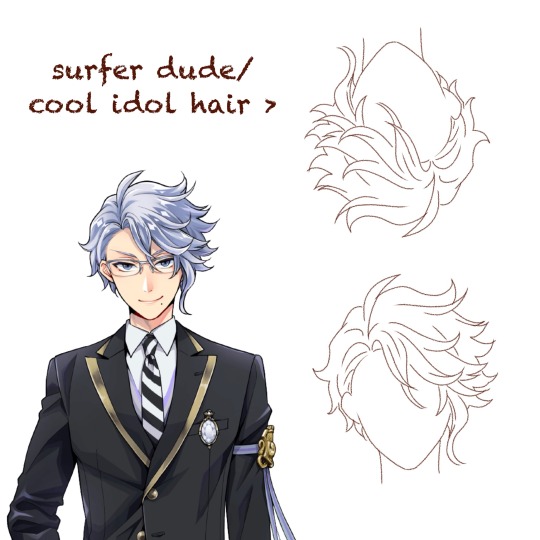
First, a few observations.
Contrary to other characters like Jamil, Riddle, or Sebek, Azul's hair doesn't immediately tell you everything about his personality. For someone as calculating and (trying to be) mature as Azul, you'd expect his hair to be slick and and each strand to be at it's proper place.
It's the contrary here. Azul has wavy, almost curly hair that is completely all over the place.
It's because that's his own struggle that is shown here. Azul has always fought against himself, being his octopus nature, his weight, or even his hair that won't stick down. That boy is just cursed to forever have something about himself that doesn't fit his aesthetic.
(Personally whenever I look at Azul upside down, I really feel like it'd be the kind of hair for a cool extroverted guy in an Idol gacha game)
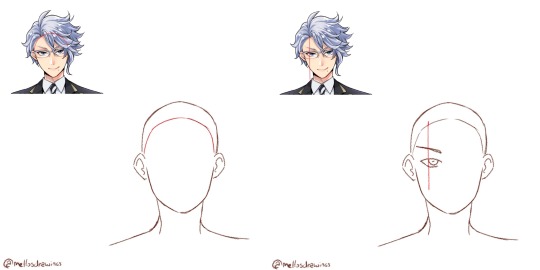
Step 1. Hairline
Azul has a simple round hairline so simply draw an arch.
Step 2. Hair root
Azul's hair all comes from a point right above the left side of his left iris, so I would suggest you draw Azul's face (and even glasses) first.
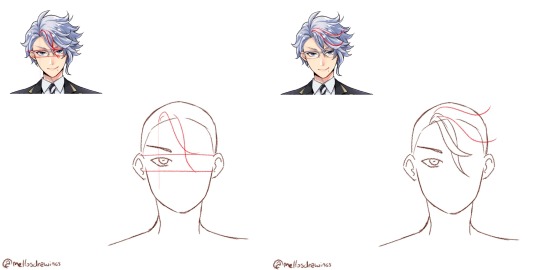
Step 3. Bangs
Azul has two strands that fall between his eyes, just a bit to the right. Start from the root point you placed earlier, and draw two wavy lines intersecting. The first will stop at the upper rim of his glasses, above his right iris area. The second will stop at the lower rim of his glasses, below his right iris area.
All of Azul's hair will be made with soft waves that fork back up, so train yourself to do that move flowingly. You're not done using it.
Step 4. Front hair 1
There are two strands that seem closer to us and frame the other bangs, so let's draw them first. In my example I drew the lower strand a bit too high, it should come right above Azul's right eye. The upper one thought will almost be horizontal. Both of those will reach the area above the right ear.
Once more, waves.
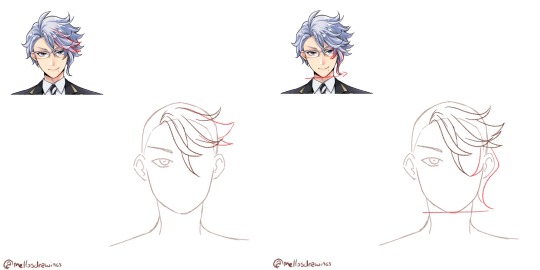
Step 5. Front hair 2
Now the two strands between the last two. They will go further than the ear.
Step 6. Side strand
Azul's tentacle-like strand. It is composed by the only strand of hair that forks towards his face, instead of outward. It goes around the eye and reaches lower than the middle strand.
The second part is the actual tentacle. It hides the ear entirely and reaches down to Azul's chin level.
Still, always a wave that forks outward.
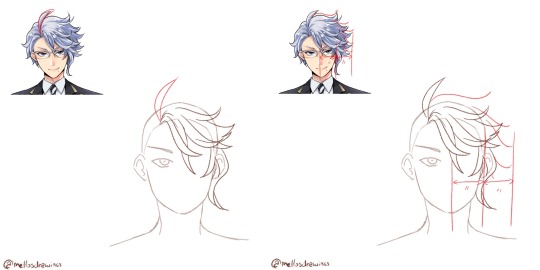
Step 7. Ahoge
Yup. "Mature" and calculating Azul has an ahoge. That might be the only part of his hair that does indeed reflect his personality. Azul can be quite immature and stupid at times. (For those who don't know, "ahoge" literally means "stupid hair" and it's usually used on stupid or immature characters)
Simply make it start at the root point. It's about the size of Azul's hairline to eyes, but globally just make it go up above where the rest of his hair would go.
Step 8. Right side
That is the part that people (even Yana if we trust the notes she made) struggle with. There is a volume here that can't be too fluffy or not big enough. It's actually just the size of half his face. Put your mark and do your best to fill it without going further.
From there, draw about 4 or 5 waves. Connecting each tip should make an arch, with the further point being the strands at Azul's eye level.
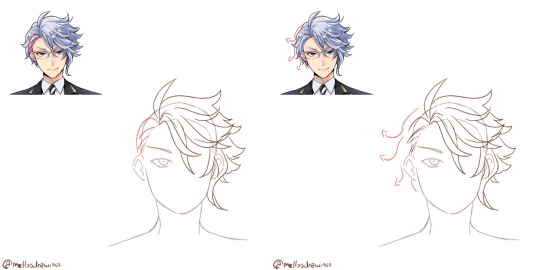
Step 9. Behind the ear
The only part of Azul's hair that is well groomed is those few strands of hair, that look like they were pushed behind his ear. This is also the only part (alongside the ahoge) that isn't made using a wave.
Step 10. Left side
And we're back to drawing waves, this time forking left. There is about 3 waves to do. These strands won't be as fluffy as the right side, sticking closer to the skull, but still add some volume. Wavy/curly hair just can't stick to the skull (I'd know it *sigh*)
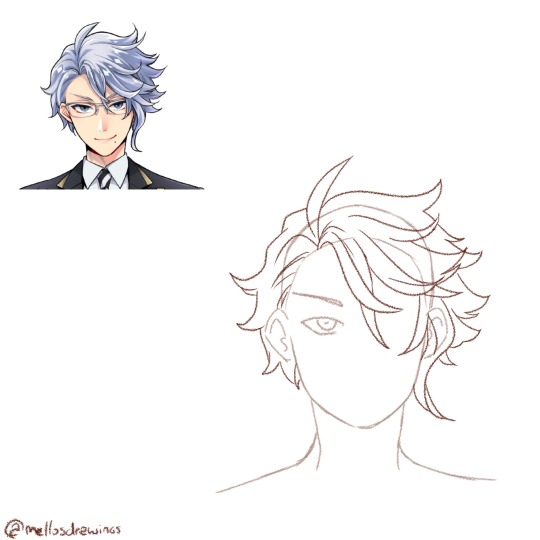
Step 11. Details
Time to check your proportions, add a few lines within the strands, add more lines at the roots to show that his hair go from here.
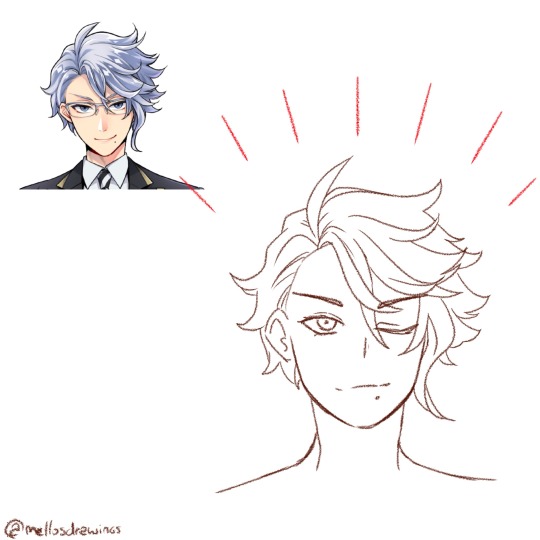
Finished!
So. Idol!Azul when? (One day. One day I'll do that Housewarden Idol AU)
(Last note: he does have an undercut. I'll forever go crazy about Azul of all people having a fuckboi (/affectionate) haircut)
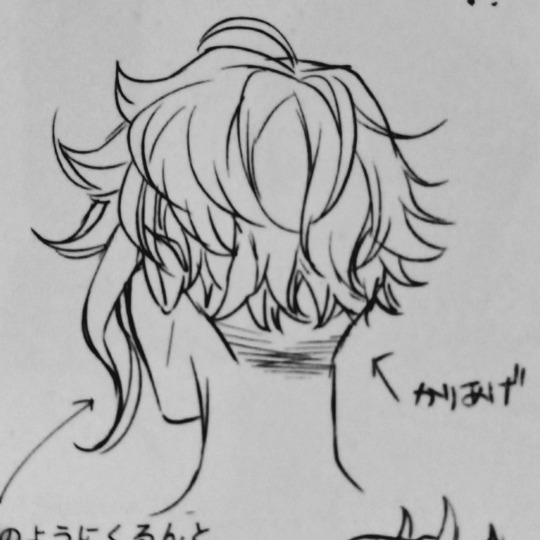
(Official pic from the Magical Archives)
#this one got long#but I spent so much time dissecting Azul's chara design#have I told you dissecting and analyzing character designs wa my fav pasttime?#mello's drawings#twisted wonderland#twst#azul ashengrotto#my art#ask me anything#analysis#art tips#step by step#tutorial#tuto#drawing tutorial
433 notes
·
View notes
Text
it’s almost the end of 2024. can we drop this absolutely inane fanonical idea that harry james potter is “oblivious” or “unobservant” or “average”?
fuck your fanon harry. fuck that soggy tissue who doesn’t inspire confidence in others. fuck that lummox who cannot string a sentence together. fuck that hothead who’d lash out in anger and throw punches at every provocation. fuck that namby-pamby who can’t read clues or between the lines or come up with a plan of action. fuck that sheep who can’t function without hermione’s direction. fuck that neanderthal who’s a messy eater, messy writer, messy speaker, and has poor manners.
who the bloody hell is that? that’s not harry james potter. why are you twisting and malforming him into a bloody clown?
why are you undermining the main character of his own series? boy has an abysmal self-esteem, stays quiet and lowkey, bottles up his truest feelings and thoughts (that we as readers are privy to, but not the other characters!), and has a calm and composed mien so you think you too can dismiss his character easily and strip him down to a skeleton of his canon self and instead carve out huge character growth, redemption arcs, and love letters for everyone else?
you wish to evoke sympathy for draco by making lucius out to be an abusive father and crafting a pitiful childhood for draco when they have an affectionate parent-child relationship canonically, but downplay harry’s abuse? you realise that tom riddle, sirius black, james potter, and hermione granger are acknowledged to be the brightest of their generation, yet forget harry potter and tom riddle are two sides of the same coin, even sharing a similar appearance, and reduce harry to a silly caricature? you make harry magically powerful but wrest his smarts away to highlight someone else’s big brain?
you make him out to be a short dork with a shorter fuse and no idea what’s going on around him when harry and tom are both described as woe-ridden orphans—with all that entails from constant hunger to cold sleepless nights to hypervigilance to the forced, quick maturity—but treat tom true to canon as tall, cunning, and clever, then do an about-face to conveniently slap the malnourished, oblivious, and slacker labels on harry to make him as lesser than?
when he picked up the impervious spell simply from having seen hermione perform it once, when his closest friends have difficulty gleaning his thoughts, when his anger is cold and sharp like dumbledore (ootp was a study in ptsd, next!), when he’s just as tall as his father, was just as ill-treated as a house elf, and rightfully brilliant as the son of lily and james potter—the two powerful and talented individuals who once had voldemort trying to recruit them to join his cause?
the sheer disrespect on his name. the sheer mockery of his character. the absolutely mind-boggling erasure of his most defining traits.
who do you think sussed out most of the big clues, and stowed away all the little, random bits of information in his memory bank, to ultimately piece the puzzle together at the final showdown every end of the school year? who realised as a mere firstie that quirrel was the man hagrid blabbed to about fluffy and the dragon egg? who noted that ginny was withdrawn and unlike herself? who had an inkling fleur had taken a fancy to bill? who picked up on what was brewing between ron and hermione before their own selves? who noticed that hermione cast a confundus on cormac mclaggen during the match? who caught on instantly to the change in tense used for the diadem’s existence and confidently tracked it down? who cottoned on to luna’s longtime disappearance from her cold, untouched bed and the layer of dust? who did voldemort consider his equal? who actually has an uncanny sense of intuition? who calls the shots when the trio gets into a pickle? who?
mcgonagall? flitwick? draco? hermione? blaise zabini? no!
excuse harry for that one time he did not look deeply into the mental workings of a grieving girl because he’s not equipped to deal with them, and has in the first place never been taught to process his own emotions properly because he didn’t grow up in a healthy environment, prohibited from expressing his feelings, let alone vulnerability, and voicing his thoughts!
let’s bury this annoyingly stupid narrative for good. go read the books and refresh your perspective. stop doing him dirty. you’ve already butchered sirius black’s character into a pathetic sisspot. and now you want to assassinate harry’s too.
#i’m so hacked off and upset and can’t bother to be more articulate or elucidate further#harry isn’t an idiot—he’s got brains brawns and brass#he’s an angry boy but he seldom vented his spleen until the trauma hit hard in ootp#harry potter deserves better#harry potter#harry potter meta#character analysis#harry james potter#golden boy hjp#tom riddle#hermione granger#ron weasley#james potter#draco malfoy#sirius black#lily evans#fuck fanon
561 notes
·
View notes